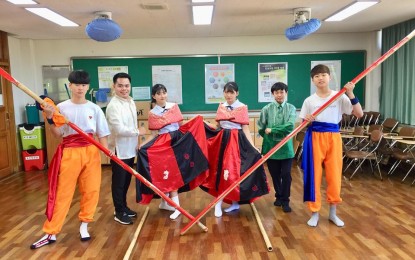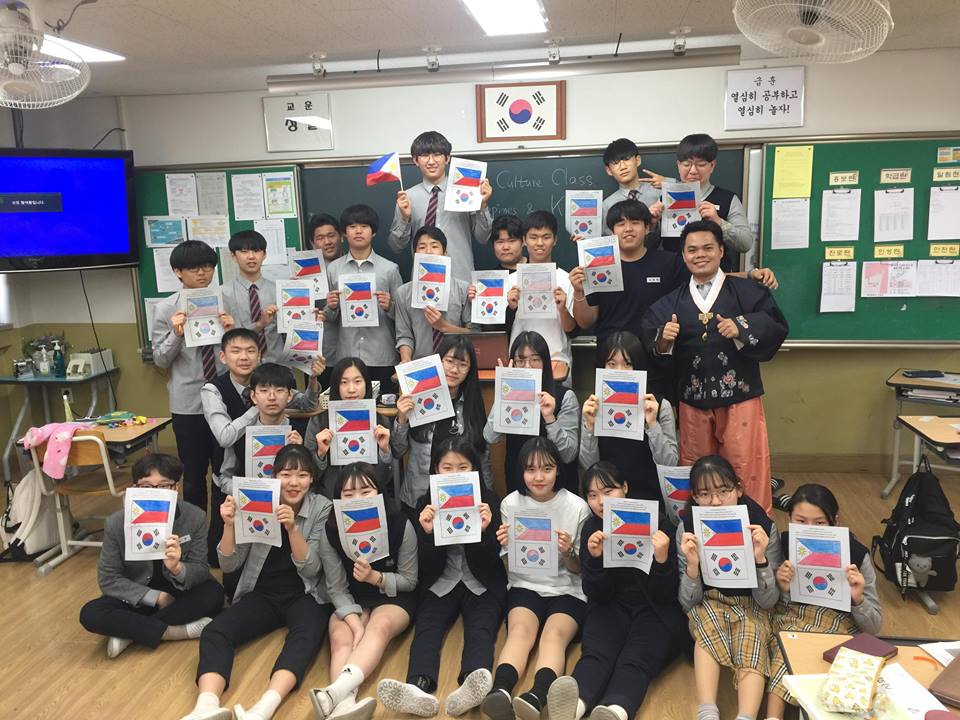Lifestyle
Kor-PH Teacher Exchange Program fosters patriotism, understanding

Korea-Philippines Exchange teacher Erwin Berry teaches selected students of Tanhyon Middle School how to dance “tinikling”. (Photo courtesy of Erwin Berry/PNA Photo)

Erwin Berry joins his students at Tanhyon Middle School in Paju, Geonggi-do South Korea. (Photo courtesy of Erwin Berry/PNA Photo)
MANILA — After his three-month teaching stint in the “Land of the Morning Calm”, Erwin Berry came back to the country invigorated and elated to share what he had learned to fellow educators and high school students of Bagbaguin National High School in Valenzuela City.
Berry, 29, is one of the participants of the annual Korea-Philippines Teacher Exchange Program by the United Nations Educational, Scientific and Cultural Organization – Asia-Pacific Centre of Education for International Understanding.
Now on its seventh year, the program aims to promote international understanding and peace through education with the support of the Department of Education (DepEd).
“Lahat po ay pwede mag-apply, kahit ilan sa division level pero12 lang po ang pipiliin na maipadala. Mahaba po ang proseso, at sa interview pa lang din po ay napakahirap na at sa tingin ko dapat mayroon kang expertise bilang guro (Anyone interested can apply in the division level but only 12 will be chosen to be sent. The process is long, and the interview is very difficult so I think you must also have an expertise as a teacher),” he told the Philippine News Agency (PNA) in an interview.
Berry said his achievements – research studies published nationally and internationally – as a doctor of education might have been his edge over other applicants in his division.
Together with 11 other elementary school teachers, he flew to South Korea and began teaching on March 26. This, after they have completed a one-day training in basic Hangul – Korea’s national language.
“I was the only high school teacher among us and I was assigned to teach middle school students at the Tanhyon Middle School in Paju, Geonggi-do South Korea,” he said.
Berry shared that his teaching experience was smooth-sailing due to the help of his mentor, who is proficient in English despite being a Korean.
“Na-shock lang ako noong first week. Umiiyak ako dahil sa language barrier. Hindi ka makapagtanong, saka unang pagkakataon ko makalabas ng bansa. Pero may translator ako kaya kapag may presentation ako, inilalagay ko na agad dun ang Korean translation dahil hindi naman sila magaling sa English ang mga mag-aaral (I was shocked during my first week. I cried because of the language barrier. I was unable to ask and it was my first time to leave the country. But I had a translator so whenever I presented, I included the Korean translation immediately because the students are not well-versed in English),” he said.
Since DepEd gave the exchange program participants the freedom to use their own teaching strategies, Berry opted to be creative in teaching Physics to his Korean high school students.
“Itinuro ko sa kanila ang dampa na isang laro sa Pilipinas. Itinuro ko kung paano laruin iyon, tapos itinuro ko kung paano kukunin ang (I taught them dampa which is a Philippine game. I taught them how to play it and how to get the) distance from point A to point B, and height and other usual Physics concept,” he said.
Berry added he also taught the students the analysis of global and environmental issues, Philippine history, and traditional dances, such as the tinikling.
“Nung nagturo ako ng tinikling, nag-observe ang parents at nag-take sila ng (When I taught tinikling, the parents observed and they took) pictures and videos. They were very interested in our country and they appreciate the Philippines because Filipinos look very happy all the time,” he said.
When asked whether Korean high school students are more intelligent compared to their Filipino counterparts, Berry said he could not say who performs better academically because their skills differ depending on the subjects. However, he noticed that the former are more disciplined in terms of study habits and time management.
Berry said learning could be easier in a Korean classroom, compared to classrooms in the Philippines because it is complete with instructional materials, including television, computers and Internet connection.
Moreover, teachers tackling different subjects collaborate to evaluate and improve one another’s strategies.
“Kasi dito sa Pilipinas, ako lang ang nagtuturo ng subject. Ako lang din mismo ang nagpa-plano. Doon sa kanila, may open class kung saan may (Because here in the Philippines, I’m the only one teaching the subject. I’m also the only one doing the lesson plan. In Korea, they have an open class where there’s a) demo teacher, head and other teachers teaching sciences, assistant principal who will plan the lessons, which will be taught and there will be a post evaluation,” he said.
Berry also pointed out how the Korean curriculum gives equal importance to sports and recreation — a practice that results in the excellent performance of Koreans during international sports competition.
“They intensify sports because they believe education also includes the cultivation of the right brain through physical activities. Hindi puro pag-aaral lang ang mga estudyante (The students do not just focus on class lessons),” he said.
Berry noticed teachers are well-supported in South Korea. Citing that teachers there are the highest paid in the world, he thought teachers in the country would feel less stressed if they are well-compensated and are given enough time to rest when shifting from one class to another.
“Kahit maraming tasks ang teachers doon, hindi sila pagod dahil paperless ang admin work at paggawa ng grades. Ang mga mag-aaral, hanggang 30 lang sa isang classroom. Walang lesson plan kasi may standardized presentation ng lessons na downloadable (Even though teachers there have a lot of tasks, they are not tired because the administrative work and computation of grades are paperless. There are only 30 students per classroom.
There is no lesson plan because there is a standardized presentation of lessons, which is downloadable),” he said.
Considering that education receives the highest funds from the national budget, Berry told PNA that the country can adopt Korea’s best practices in teaching with the benefit of the learners and educators in mind.
His teaching experience in South Korea taught him something greater than learning innovative teaching strategies and imbibing excellent work ethics.
“This opportunity led me to reflect on my being a Filipino. Hindi ako nag-focus lang sa subject na tinuturo ko. Nag-aral ko tungkol sa Philippine history dahil marami silang tanong about our country at na-appreciate ko ang pagka-Pilipino ko at kakayahan ko makisalamuhaat makipagtrabaho nang maayos sa ibang lahi (I didn’t focus only on the subject that I was teaching. I also studied Philippine history because they have a lot of questions about our country and I was able to appreciate myself as a Filipino and my ability to mingle and work well with other nationalities),” he said.
On June 23, Berry returned to the country together with the other Filipino exchange teachers. He said their Korean counterparts have arrived and reported to the DepEd central office on Monday for the commencement of their teaching arrangements. (PNA)





















